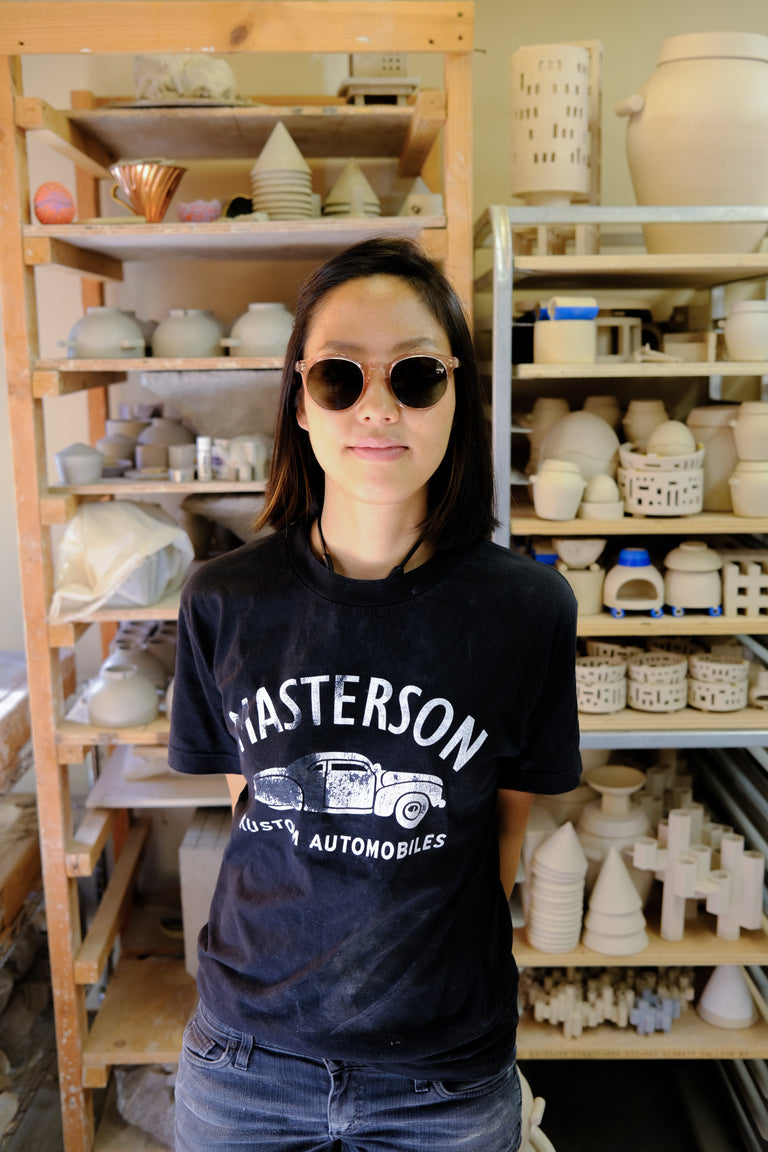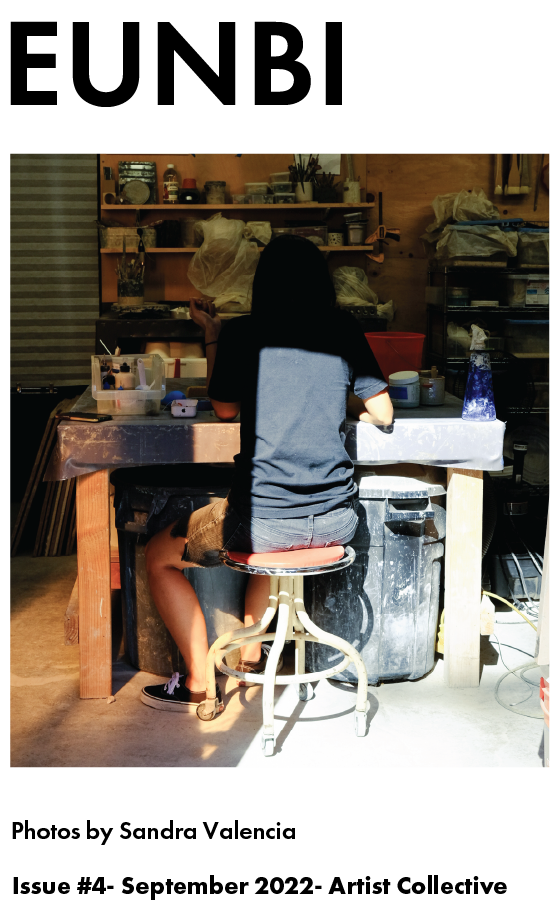


Eunbi Cho never imagined being a professional ceramicist. Growing up between Korea and Belgium, she envisioned a career that was more business, less play. But after moving to LA in 2011 with a degree in Fiber Arts and chancing into an assistant’s position for a tiny ceramic studio, Cho had a revelation that might have eluded those without her inner resources: “If this is how you practice and make a living, I can probably do it as well.”
Since launching EUNBI in 2016, Cho’s meticulously crafted, ferociously imaginative work has made her an artist to watch. Commissions soon followed from high-profile clients, including the interior design emporium Hammer and Spear and Majordomo Las Vegas. Cho’s methodical yet intuitive approach applies equally to EUNBI’s practical objects—kimchi jars, lanterns, cups with straws—as to more fanciful creations, such as an ambitious worldbuilding project inspired by Italo Calvino’s Invisible Cities.
Recognizing Eunbi as a kindred spirit and fellow advocate for craft, we tapped her to be our first partner in the AHLEM Artist Collective series, kicking off at our Venice atelier on September 10. (Happily, she accepted.) During the three-month residency, custom EUNBI pieces will be available for viewing and purchase on site. In advance of her AHLEM Artist Collective opening party, we sat down with Eunbi in her backyard studio in South Pasadena to talk inspirations, bicycling and the imaginative lure of deep sea worlds.
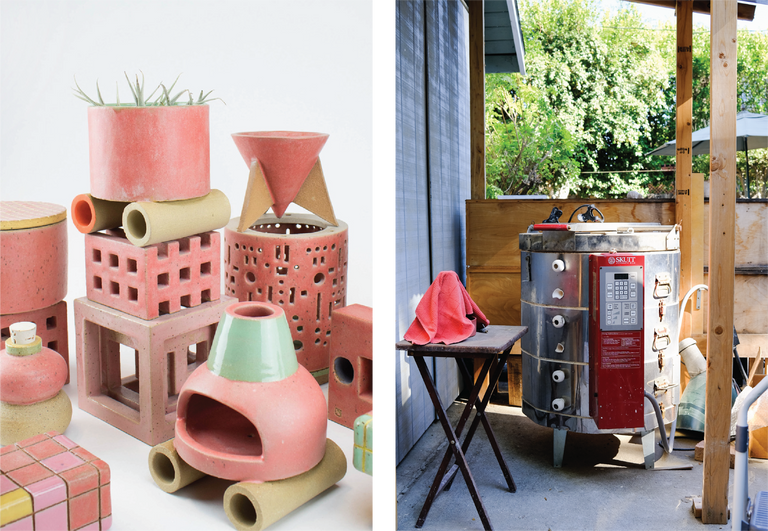


What do you love about working with clay?
The texture, but the stages of the material too—it's not something you design and drop it. You have to consistently care and look through it every day, like a plant. If you miss a day, you may miss something. I really like every stage of it. Every step is decided by me. I like that power. I always say I don't have that much control in my life, so for me to be able to control this outcome is very satisfying.
I have very short focus time, so having this fast output was very attractive. And then also, ceramics is something you can actually use in your daily life.
How would you describe your work?
I would say it’s very tidy. Even if the size is big, it's a very tidy job and it requires a lot of attention to detail. If I miss something, it will affect the next step. I think my work is also pretty obsessive. And I want to say playful. Also intuitive—I want to embed the intuitive side of it, if I could.
What inspires you?
I get inspired by things you don't imagine would exist—the deep sea, anything uncontrollable or unseen, has been my biggest attraction. I get really obsessed by the colors, a color of sunset or flowers. Because sunset, sometimes it's purple tones, sometimes it's pink tones, sometimes it's bluish green, and everything is just uncontrollable. And any ruins, debris, abandoned factories or gas stations. I don't know why I get so thrilled by those.
And in daily life, I get inspired more by inconvenience. For example, this stupid cup, Oh, I wish there was a cup with a straw. I want to make life a little more convenient.
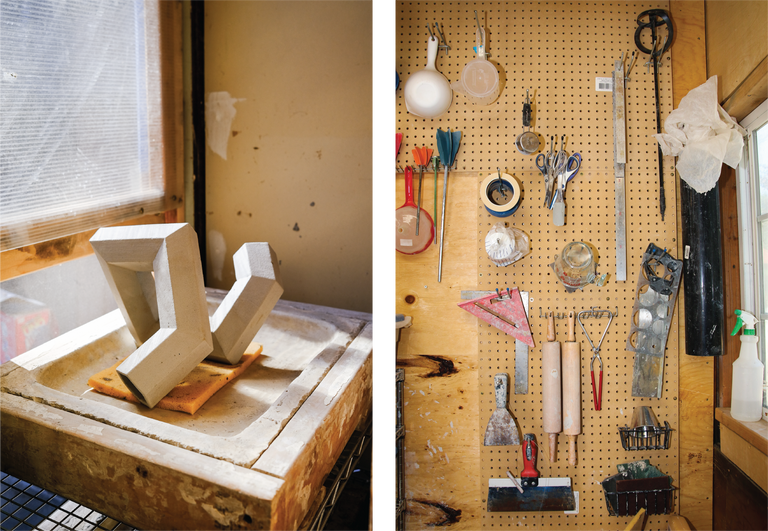


Your ceramics balance form and function—can you tell us about the relationship between the two?
Usually I want a form or a function. There is one thing I prioritize first. For example, with these cubes, I purely wanted a form for some reason, which is rare for me. But I grew up in a small household. In Asia, we don't have big houses; you have a condo with five people living in a small room. If you want to bring something to a home, you have to have a reason, you have to defend it. So I think function is very important for me. If you're just beautiful, you don't mean as much to me.
What sustains you creatively?
What sustains me creatively is having time to completely detach myself from what I'm doing. I'll go ride the wave and stay on the beach for an entire day. I'll take really long walks to the park, or I'll go for a hike, or I'll go for a bike ride. Bicycling has always been an outlet for me, like, Okay. Nothing matters, I'm alone, I'm responsible for myself. Just the feeling of me moving these two wheels, going somewhere (using myself as a fuel), means a lot to me because it's a pure form of my work taking me to a destination. I put that in mind when I'm working, like, If I'm doing this, it'll take me somewhere.
Are there themes or ideas you find yourself returning to in your work?
I used to get inspired by a lot of different things until I came across this book called Invisible Cities by Italo Calvino. It’s a short fiction consisting of Marco Polo describing the cities he has visited to Kublai Khan. When I read it, it creates the entire vision in my head, because I grew up in a city. I was homesick a little bit—I grew up in a 14-story apartment building [in Korea], where you could see the night skyline, but when I came here everything was so flat. Reading this book really creates a seen environment. I've been working based on it since 2017. Calvino described it, but I built it in my own way. If I'm blocked, I'll reread this book, whatever my favorite chapter, and then it brings the wild imagination
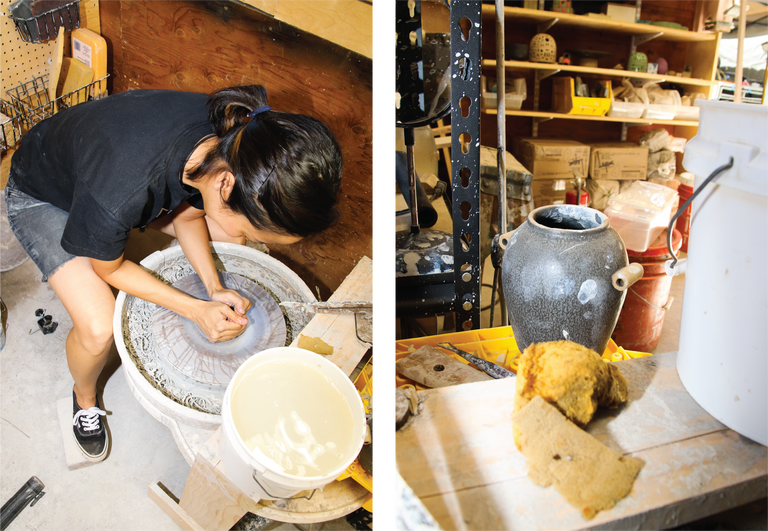


You’ve talked about being influenced by the places where you’ve lived. Can you share a bit about how they inform your work?
We moved to Belgium for about four years in 1993, and I saw how differently they treat a child in Asia and in Europe. In Asia, kids are more like this unaccomplished little thing that does not know anything, versus Europe, which is like, Oh this little miracle has its own mind and is smart. That was a big change. I think that those four years in Belgium really formed something inside me. Traveling made me see that there's so many different types of people. Living in Belgium, living in Korea, and then moving to the United States, I learned how to always keep myself in the core, even if the situation and environment changes.
What are you most proud of?
I grew up in a family where compliments were very rare, right? If you get 90 out of 100, it's like, "Where's your 10 points?" versus, "Great job." So for me to see people enjoying my work and really getting back to me—“Yeah, I love this. I didn't know you could do this with it,” or “Hey, I'm using this in a certain way”—everything makes me really proud. It almost makes sense, because I'm seeking from the world a compliment I didn't get from my parents. And for some reason, I'm getting it. I'm proud of that.
What are your plans for EUNBI?
Right now, I would like to be part of more shows and fairs. Ultimately, if you went to outer space, or another planet, and discovered a really cool ruin that some alien has made—I want to create that feeling. I want to make an entire room, or a scene with tiles and big furniture, a room made of only ceramics. I really want to try that. That would be my dream
